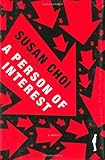
I love the double-entendre in this title. "Lush" can be interpreted as describing the classy restaurants and shops of the Upper East Side of NYC, or it can refer to the alcohol and drug abuse that is rampant. One reviewer noted that the mystery in the novel is resolved in the first third of the book. However, what the reviewer called "mystery" struck me as frustrating, so that I was relieved by its early resolution. The author seemed to be sowing the seeds of doubt for the reader, and I thought it made for a rather beguiling beginning actually. In any case, this is not a mystery novel or a thriller. It's a novel about solving a crime from a police detective's point of view. The cop is Matty Clark, and the other main character is Eric Cash, a restaurant manager who flees the scene when Ike, one of the guys he's out partying with, is shot on the street. Ike's father is so disoriented by the death of this son that he avoids his family and even tries to solve the murder himself. Matty finally begins to examine his own family issues, as his sons are not exactly model citizens. More exasperating, though, to Matty, is the lack of cooperation on the part of his supervisors. When it becomes clear that their mistakes have been a major hindrance to the totally botched investigation, Matty has to take the blame and overcome the consequences—persuading an indignant witness to provide more clues.
















































